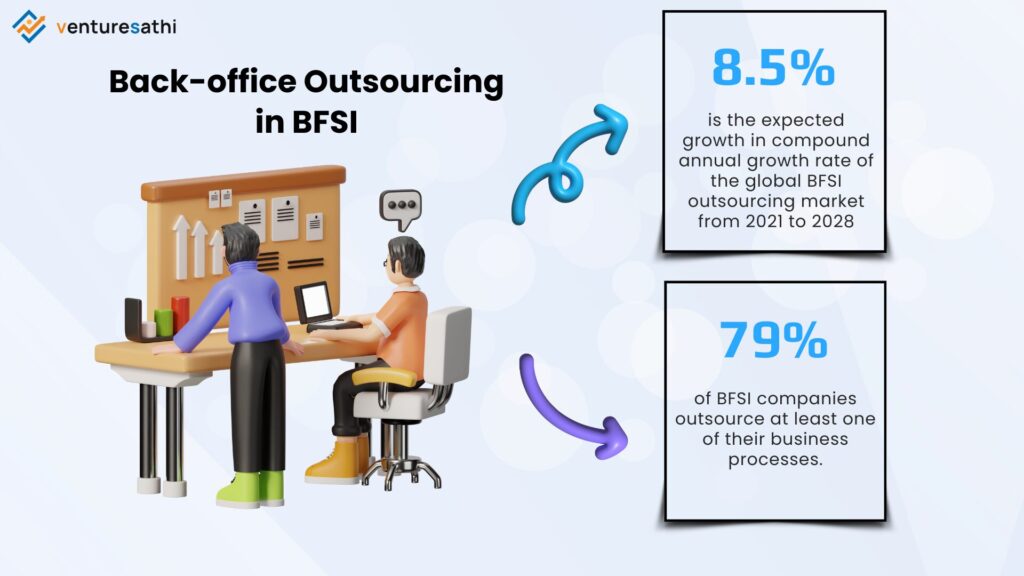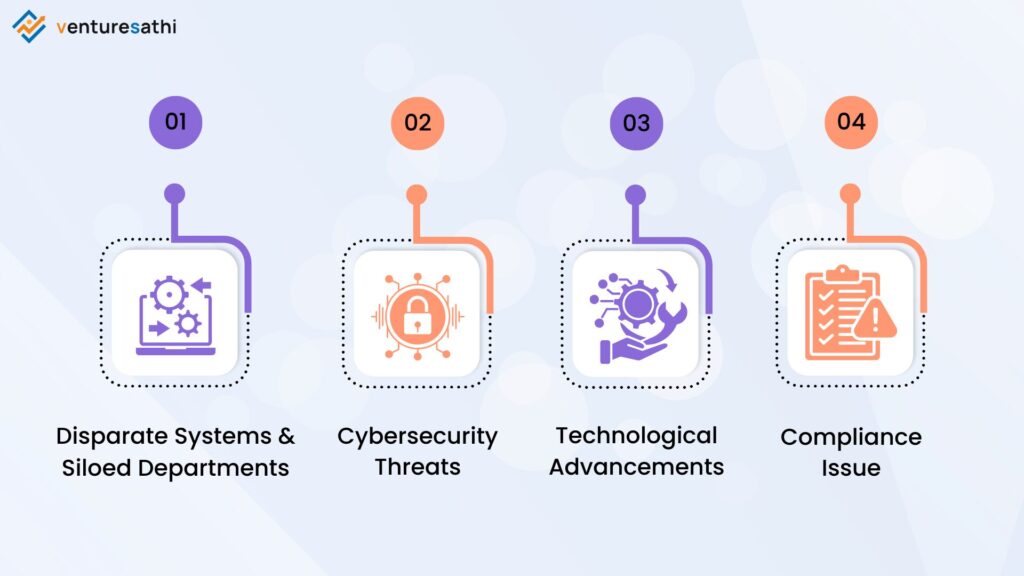
Introduction
The Banking, Financial Services, and Insurance (BFSI) industry is increasingly outsourcing its back-office operations to streamline processes, reduce costs, and improve efficiency. According to a report by Grand View Research, the global BFSI outsourcing market size was valued at USD 215.21 billion in 2020 and is expected to grow at a compound annual growth rate (CAGR) of 8.5% from 2021 to 2028.
The BFSI industry outsources back-office operations primarily to focus on core competencies such as customer service, product development, and risk management. According to a survey by Deloitte, 79% of BFSI companies outsource at least one of their business processes. Outsourcing enables BFSI firms to tap into specialized skills and expertise that might be lacking internally. Additionally, outsourcing helps BFSI companies reduce costs by leveraging economies of scale and accessing cheaper labor markets.
Several back-office operations in banking can be outsourced, including data entry, document processing, account reconciliation, transaction processing, and customer support. These operations are typically repetitive and time-consuming, making them ideal for outsourcing to specialized service providers.
Global best practices in outsourcing back-office operations for banking or BFSI include partnering with reputable service providers, conducting thorough due diligence, defining clear service level agreements (SLAs), and establishing robust communication channels. Additionally, BFSI companies should continuously monitor and evaluate the performance of their outsourcing partners to ensure compliance with regulatory requirements and industry standards.
If you’re looking to supercharge your BFSI success with back-office optimization, check out our latest blog!
Understanding Back-Office Operations
Back-office operations in banking encompass a wide range of functions, including data processing, record keeping, compliance monitoring, and financial reporting. These functions are critical for supporting front-office functions such as customer service, sales, and marketing.
The back office supports front-office functions by ensuring that all transactions are processed accurately and efficiently. Without a well-functioning back-office, front-office operations would suffer, leading to poor customer service and reduced profitability.
The front office is responsible for customer-facing activities such as sales, marketing, and customer service. In contrast, the back office is responsible for internal operations such as data processing, record keeping, and compliance monitoring. Both front and back-office functions are essential for the smooth operation of a banking or BFSI company.
Interested in streamlining communication with contact center solutions tailored for banking, don’t miss our latest blog post on the subject!
Key Challenges in Back-Office Operations

1. Disparate Systems and Siloed Departments
One of the key challenges in back-office operations is disparate systems and siloed departments, which can lead to inefficiencies and errors. For example, Paytm faced fraud-related issues due to a lack of integration between its different departments, leading to fraudulent transactions.
2. Cybersecurity Threats
Another challenge in back-office operations is cybersecurity threats, which are becoming increasingly sophisticated and difficult to detect. BFSI companies need to invest in robust cybersecurity measures to protect their sensitive data from cyber-attacks.
3. Keeping Up with Technological Advancements
The rapid pace of technological advancements poses a challenge for back-office operations, as companies need to constantly upgrade their systems and processes to stay competitive. Failure to keep up with technological advancements can lead to inefficiencies and reduced productivity.
4. Compliance Issue
Compliance with regulatory requirements is a major challenge for back-office operations, especially for BFSI companies operating in multiple countries. Each country has its own set of regulations, and banks need to ensure compliance with all of them to avoid penalties and fines. For example, the Securities and Exchange Commission (SEC) in the US and the Securities and Exchange Board of India (SEBI) in India have specific regulations that banks need to adhere to.
Recent cases in banking in the US market highlight the importance of compliance in back-office operations. For example, Wells Fargo was fined $3 billion by the SEC for opening unauthorized accounts, highlighting the need for robust compliance mechanisms in back-office operations.
Discover how our latest blog post, “Streamlining Communication: Contact Center Solutions for Banking,” can revolutionize your banking operations!
Modernizing Back-Office Operations
To modernize back-office operations, BFSI companies need to embrace new tools and technologies that can streamline processes and improve efficiency. For example, adopting cloud-based solutions can help banks reduce costs and improve scalability.
Automation and digital transformation are key trends in modernizing back-office operations. BFSI companies can leverage automation to streamline repetitive tasks and improve accuracy. Additionally, digital transformation can improve the customer experience (CX) and employee experience (EX) by providing access to real-time information and personalized services.
Data analytics can provide valuable insights into back-office operations, allowing BFSI companies to make informed decisions and improve efficiency. For example, banks can use data analytics to identify trends and patterns in customer behavior, allowing them to tailor their products and services accordingly.
Our team of experts at Venturesathi is dedicated to helping you optimize your back-office operations and achieve your business objectives. Contact us today!
Strategies for Implementing Back-Office Solutions

1. Partnerships for Technological Advancement
To implement back-office solutions successfully, BFSI companies should collaborate with technology partners and fintech companies that can provide specialized expertise and innovative solutions. By partnering with the right partners, BFSI companies can leverage the latest technologies and stay ahead of the competition.
2. Employee Skill Enhancement
Employee training and development are crucial for successfully implementing back-office solutions. BFSI companies should invest in training programs that can enhance employees’ skills and help them adapt to new technologies and processes.
3. Effective Monitoring and Evaluation
To ensure the effectiveness of back-office solutions, BFSI companies should establish robust monitoring and evaluation mechanisms. This includes regularly monitoring key performance indicators (KPIs) and conducting periodic reviews to identify areas for improvement.
4. Sustainable Back-Office Practices
In addition to modernizing back-office operations, BFSI companies should also focus on sustainability. This includes reducing paper usage, optimizing technology use in the back office, and improving user experience (UX) for employees. By adopting sustainable practices, BFSI companies can reduce costs and minimize their environmental impact.
Takeaway
Back-office outsourcing is a key strategy for BFSI companies looking to streamline operations, reduce costs, and improve efficiency. By understanding the key functions that can be outsourced, global best practices, challenges, and strategies for implementing back-office solutions, BFSI companies can achieve operational excellence and stay ahead of the competition.
BFSI companies need to embrace modernization and efficiency in back-office operations to stay competitive in the rapidly evolving market. By investing in new tools and technologies, collaborating with technology partners, and investing in employee training and development, BFSI companies can achieve operational excellence and drive growth in the digital age.
For further inquiries or assistance in implementing modern back-office solutions for your banking or BFSI institution, contact us today. Our Venturesathi team of experts is dedicated to helping you optimize your back-office operations and achieve your business objectives.


